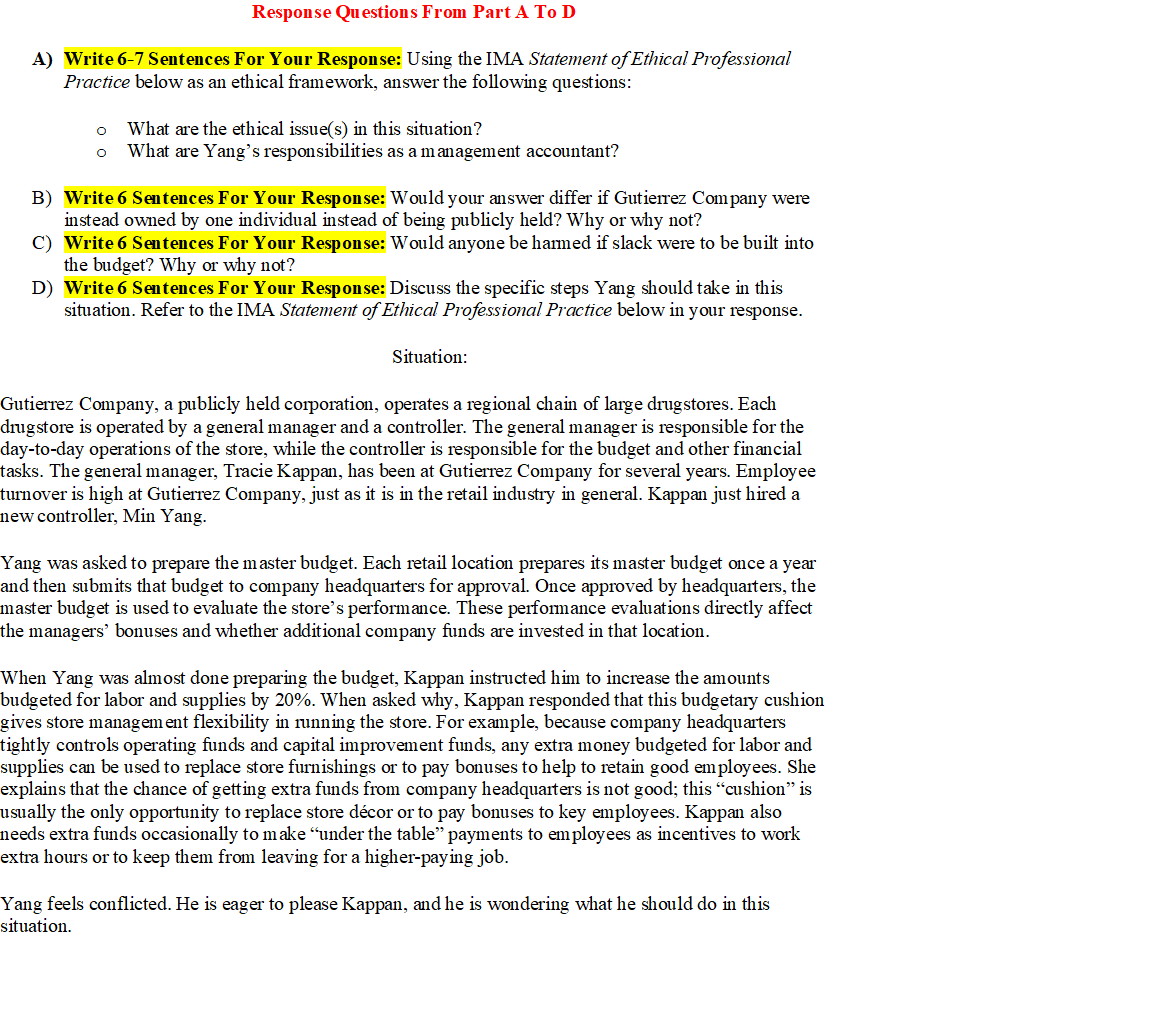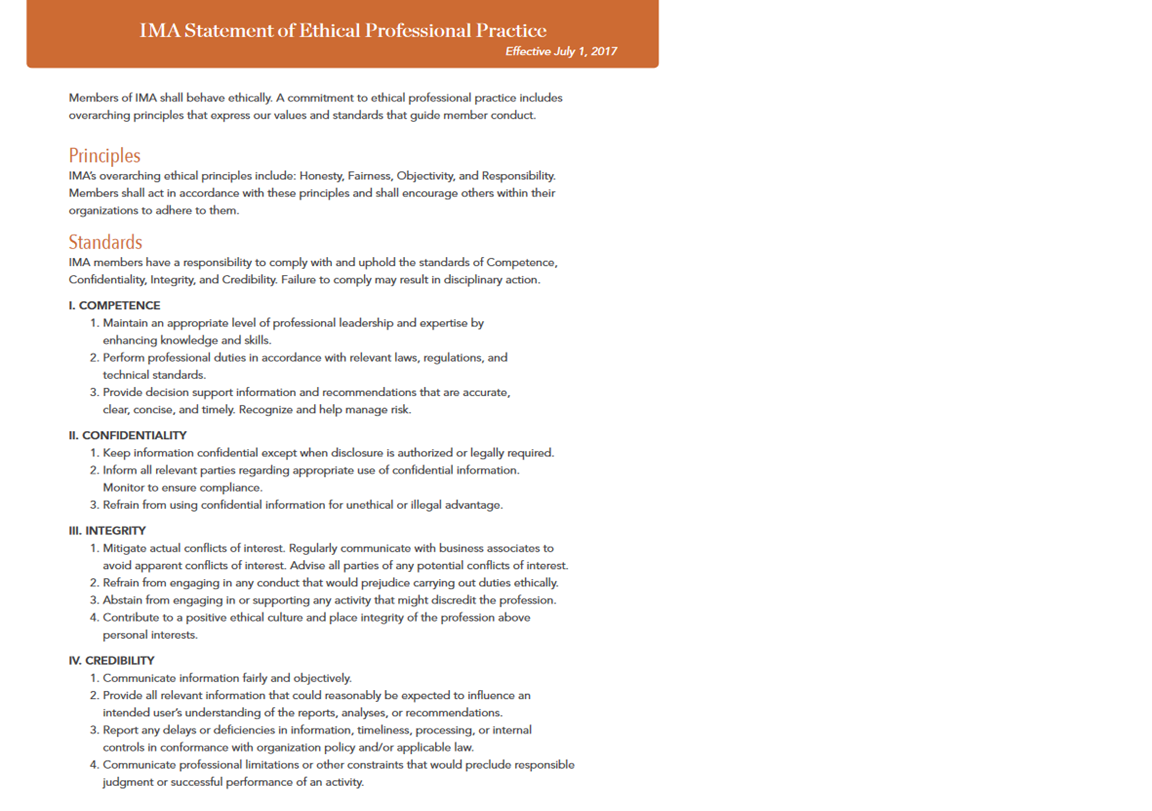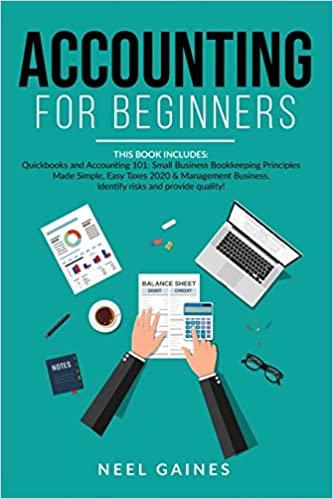

Response Questions From Part A TOD A) Write 6-7 Sentences For Your Response: Using the IMA Statement of Ethical Professional Practice below as an ethical framework, answer the following questions: o What are the ethical issue(s) in this situation? o What are Yang's responsibilities as a management accountant? c) We budget? Why or why not? Response: Dis Write 6 Sentences For Your Response: Would your answer differ if Gutierrez Company were instead owned by one individual instead of being publicly held? Why or why not? Write 6 Sentences For Your Response: Would anyone be harmed if slack were to be built into the budget? Why or why not? Write 6 Sentences For Your Response: Discuss the specific steps Yang should take in this situation. Refer to the IMA Statement of Ethical Professional Practice below in your response. D ) Situation: Gutierrez Company, a publicly held corporation, operates a regional chain of large drugstores. Each drugstore is operated by a general manager and a controller. The general manager is responsible for the day-to-day operations of the store, while the controller is responsible for the budget and other financial tasks. The general manager, Tracie Kappan, has been at Gutierrez Company for several years. Employee turnover is high at Gutierrez Company, just as it is in the retail industry in general. Kappan just hired a new controller, Min Yang. Yang was asked to prepare the master budget. Each retail location prepares its master budget once a year and then submits that budget to company headquarters for approval. Once approved by headquarters, the master budget is used to evaluate the store's performance. These performance evaluations directly affect the managers' bonuses and whether additional company funds are invested in that location. When Yang was almost done preparing the budget, Kappan instructed him to increase the amounts budgeted for labor and supplies by 20%. When asked why, Kappan responded that this budgetary cushion gives store management flexibility in running the store. For example, because company headquarters tightly controls operating funds and capital improvement funds, any extra money budgeted for labor and supplies can be used to replace store furnishings or to pay bonuses to help to retain good employees. She explains that the chance of getting extra funds from company headquarters is not good; this "cushion" is usually the only opportunity to replace store dcor or to pay bonuses to key employees. Kappan also needs extra funds occasionally to make under the table payments to employees as incentives to work extra hours or to keep them from leaving for a higher-paying job. Yang feels conflicted. He is eager to please Kappan, and he is wondering what he should do in this situation. IMA Statement of Ethical Professional Practice Effective July 1, 2017 Members of IMA shall behave ethically. A commitment to ethical professional practice includes overarching principles that express our values and standards that guide member conduct. Principles IMA's overarching ethical principles include: Honesty, Fairness, Objectivity, and Responsibility Members shall act in accordance with these principles and shall encourage others within their organizations to adhere to them. Standards IMA mombers have a responsibility to comply with and uphold the standards of Competence, Confidentiality, Integrity, and Credibility. Failure to comply may result in disciplinary action. I. COMPETENCE 1. Maintain an appropriate level of professional leadership and expertise by enhancing knowledge and skills. 2. Perform professional duties in accordance with relevant laws, regulations, and technical standards. 3. Provide decision support information and recommendations that are accurate, clear, concise, and timely. Recognize and help manage risk. II. CONFIDENTIALITY 1. Keep information confidential except when disclosure is authorized or legally required. 2. Inform all relevant parties regarding appropriate use of confidential information. Monitor to ensure compliance. 3. Rofrain from using confidential information for unethical or illegal advantago. III. INTEGRITY 1. Mitigate actual conflicts of interest. Regularly communicate with business associates to avoid apparent conflicts of interest. Advise all parties of any potential conflicts of interest. 2. Refrain from engaging in any conduct that would prejudice carrying out duties ethically. 3. Abstain from engaging in or supporting any activity that might discredit the profession. 4. Contribute to a positive ethical culture and place integrity of the profession above personal interests. IV. CREDIBILITY 1. Communicate information fairly and objectively. 2. Provide all relevant information that could reasonably be expected to influence an intended user's understanding of the reports, analyses, or recommendations. 3. Report any delays or deficiencies in information, timeliness, processing, or internal controls in conformance with organization policy and/or applicable law. 4. Communicate professional limitations or other constraints that would precludo responsible judgment or successful performance of an activity








